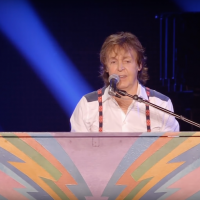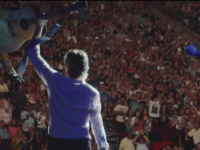At the United Center, Chicago: When attending a Paul McCartney concert, there are several guarantees: He will play an abundance of Beatles and Wings material, will toss in some recent tracks, and will astound with his seemingly boundless energy. Coming off a recent illness, McCartney appeared trim, fit, and ready to rock as he took the stage on July 9. Playing to a sold-out crowd, he treated fans to a nearly three-hour show packed with memories, emotions, and a desire to demonstrate that at 72, he has no plans to slow down.
Clad in a light blue jacket, white shirt, black pants, and his iconic Cuban heels (aka “Beatle Boots”), McCartney bounded on stage and immediately launched into “Eight Days A Week” for the opening number. He and the band segued into “Save Us” from McCartney’s recent album New, and the live performance enlivens the studio version. Wings fans were not neglected, however: He turned in renditions of the charming “Listen to What the Man Said” and the Band on the Run track “Nineteen Hundred and Eighty-Five,” his piano playing on the latter a standout.
During his concerts, his instruments have become almost as famous as McCartney himself. He often wielded his signature Hofner bass, but at one point changed to the 1964 Epiphone Casino, the same guitar he played on “Paperback Writer.” Hearing the same guitar licks used on that recording added even more weight to an already-classic track.
As on his recent tours, McCartney reserved time to pay tribute to his former bandmates and late wife Linda. His rendition of the Tug of War song “Here Today” eloquently celebrated his friendship with John Lennon, and tasteful video effects enhance the song’s deep emotion. As he stood on a platform, strumming his acoustic guitar, images of waterfalls were superimposed on the stage. When he sang lines such as “I really loved you and was glad you came along,” one could practically hear a pin drop in the huge United Center. He continued with his moving, ukulele-fueled version of “Something” as a salute to George Harrison, while “Maybe I’m Amazed” stood as his lasting love song to Linda — though, curiously, no photos of her accompanied the track.
McCartney diverted little from recent setlists, although the inclusion of the beautiful “And I Love Her” was a welcome change. The Hard Day’s Night references continued with “All My Loving”; as he crooned the song, images from the film played in the background. Watching McCartney 50 years ago and today, it’s evident how he and the Beatles have retained their ranking as major figures in music and pop culture history.
Hardcore fans may quibble that McCartney rarely includes deep tracks these days. Yes, the usual suspects were included: “Hey Jude,” “Let It Be,” and “Get Back” all made appearances. He also trotted out the oft-told stories about how he wrote “Blackbird,” and the time Jimi Hendrix performed “Sgt. Pepper’s Lonely Hearts Club Band” just after the album was first released. Yes, he led the audience in the massive “Hey Jude” singalong, pointing at random audience members while exclaiming “And you were great! And you were great!”
While rarer tracks would be appreciated, these now familiar moments have become part of the McCartney concert experience. His audience knows what to expect, and he always delivers.
For every overly familiar moment, there was McCartney almost scatting toward the end of “Lovely Rita” or screaming on “Helter Skelter.” He has sung “Yesterday” and “Eleanor Rigby” countless times, yet he somehow makes them sound fresh every time.
His talented band (Brian Ray and Rusty Anderson on guitars, Wix Wickens on keyboards, and Abe Laboriel, Jr. on drums) functions as a tight unit, executing difficult harmonies on “Paperback Writer” and “We Can Work It Out” with ease. The group’s live version of “I’ve Just Seen A Face” was as flawless as the Help! original.
Appropriately concluding with “Golden Slumbers/Carry That Weight/The End,” McCartney remained as energetic as he did at the concert’s beginning. He had delivered what the audience desired, yet proved that he still has something to say musically.
In recent years, his song selection has leaned heavily toward rock, demonstrating that the stereotype of McCartney as balladeer only is inaccurate. His obvious love of performing, his charisma, and his ability to relate to the crowd make concerts such as his Chicago stop unforgettable events.
- The Rescued Early Paul McCartney Song That Completed ‘Beatles For Sale’ - December 4, 2024
- A Rare Beatles Cover Proves John Lennon Was Wrong About His Voice - November 26, 2024
- How John Lennon Came Roaring Back on the Beatles’ White Album - November 22, 2023



